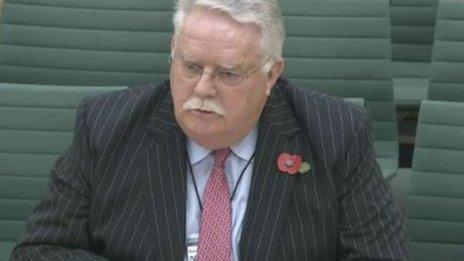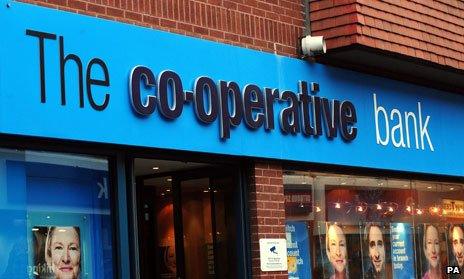How did Flowers bloom at Co-op Bank?
- Published

I spent a bit of time yesterday trying to find out a bit more about the Reverend Paul Flowers - because it is not every day that a former bank chairman is caught on camera apparently trying to buy cocaine and crystal meth from the front of a car in Leeds.
But Mr Flowers, who stepped down as chairman of the Co-operative Bank and vice chairman (no pun intended) of the Co-operative Group in June this year, was no ordinary banker.
He is a "superintendent" Methodist minister and a trustee for Methodist Church Purposes, inter alia, and a Labour party politician in local government.
Mr Flowers has been a serial local councillor, first trying to stand for the council in Coventry, and becoming a councillor first in Rochdale and then latterly in Bradford.
What he also did was join the political wing of the Co-operative Group, where over a period of years he got himself elected first to an area committee, then a regional board and finally the national board.
Those who know him say he is clever, persuasive and forceful. On the Methodist church's website, he describes himself as "known for an objective rigour and for asking the questions others might avoid".
As a skilled politician, his rise and rise through the ranks of the co-operative movement was not, colleagues say, terribly challenging for him.
Now you may notice that nowhere in this description of his career is there any sign that he has worked in banking in any senior capacity (or indeed, in any capacity at all).
At various times he chaired the drug abuse charity Lifeline (or so the Manchester Evening News reported in 2010), was a member of the Advertising Standards Authority and was vice chair of the National Association of Citizens' Advice Bureaux.
All of which are a long way from the world of credit risk and deposit protection.
So how on earth did he end up on 29 March 2010 becoming chairman of the Co-operative Bank - a bank with £50bn of assets, £36bn of customer deposits and 4.7 million customers?
Well it stemmed from a power struggle within the co-operative movement, after United Co-operatives merged with the Co-operative Group in 2007 - or so I am told.
Remember that his appointment coincided with the most challenging time in the bank's history. The previous year it trebled in size by merging with the Britannia Building Society, to create what Co-op and the Britannia styled a super mutual.
This merger turned out, as we now know, to be something of a disaster, in that losses on loans made by Britannia and the costs of writing off an expensive IT project have taken the bank to the brink of collapse - and Co-op is in the throes, as we speak, of securing agreement from creditors for its rescue deal.
His appointment also came more than two years after the worst British banking crisis since at least 1913 and probably ever, and after those who ran the regulator, the Financial Services Authority, had pledged they would take extra care to make sure that those appointed to chair banks had appropriate skills and knowledge.
So how and why did the FSA approve the appointment of Mr Flowers?
As it happens, I am told that Flowers's political rivals within the cooperative movement were surprised and disappointed that his appointment was approved by the FSA - which has now been broken up, and replaced by the Bank of England's Prudential Regulation Authority and the separate Financial Conduct Authority.
What on earth did the FSA ask Flowers when they interviewed him to sanction his appointment?
When earlier this month he gave evidence to the Treasury Select Committee, he seemed to have no grasp of the magnitude of the bank's asset, or its loans and investments - which as the committee chairman, Andrew Tyrie, pointed out, is pretty basic stuff.
And the FSA's seemingly lackadaisical approach to his appointment was - many would say - compounded, by the fact that it allowed Co-op Bank for months on Mr Flowers' watch to negotiate another huge deal, to treble in size by buying more than 600 branches from Lloyds (a deal from which Co-op ultimately withdrew, when it belatedly recognised it was beyond its management capabilities).
There's another thing too.

A few weeks ago, the Treasury Select Committee was told by Neville Richardson, the former boss of Britannia who was chief executive of Co-op Bank when Mr Flowers was chairman, that he quit as the bank's CEO in the summer of 2011 because he believed it was being forced by its owner, Co-op Group, to bite off more than it could chew, with assorted reorganisation and expansion plans.
Normally when a bank boss quits, the regulator would immediately interrogate him, to find out if it's a sign of something going wrong at the bank. But we still don't know if the FSA did interrogate Richardson then and what it learned.
What we do know is that it was not till the end of 2012 that alarm bells began to properly ring at the regulator about what was going on at Co-op Bank - but even then it did not really get a grip till the spring of this year.
Better late than never, many would say. And although investors in the bank's bonds are incurring losses of many hundreds of million pounds, the rescue of Co-op Bank won't involve a contribution from taxpayers (although even a few weeks ago, that was by no means certain).
That said, and to state the bloomin' obvious, regulators at the defunct FSA and its successor body, the PRA, have a few questions to answer, about why they gave the thumbs up to Mr Flowers.
There's also an important governance issue for the Co-op Group, about whether it is really appropriate for those who rise up through the political side of the co-operative movement to be able to exercise significant influence over its commercial activities.
At the bank, of course, the stable door was closed after the horse was long gone. Mr Flowers was replaced as Co-op Bank chairman by a proper banker, Richard Pym.
PS. I am told Mr Flowers used his platform as Co-op chairman to increase his influence with senior members of the Labour Party. He was on a finance and industry advisory group set up by the Labour leader, Ed Miliband.
Update 16:20
I have learned a bit more about the checks that the Financial Services Authority carried out on Paul Flowers before authorising him to be a non-executive director of Co-op Bank and then the bank's chairman.
Because a non-executive post at a large bank such as the Co-op Bank was deemed by the FSA to have "significant influence", I am told Mr Flowers was subjected to a "rigorous interview" in 2009, when first becoming a non-exec.
And he had another FSA interview when he became chairman in 2010 - although this was less rigorous, I am led to believe, because at the time the FSA did not regard the posts of chairman and non-executive director as massively different (it has since changed its tune on this, and would run a much more systematic and detailed vetting process when approving the appointment of a chairman today than it did then).
Apparently Mr Flowers admitted to the FSA that he did not have applicable experience in the financial services industry. But the FSA felt that Co-op Bank could compensate for this shortcoming, by appointing two deputy chairmen, who were also the senior independent directors (or SIDs) - which duly happened.
That said the FSA did believe Mr Flowers's political skills would be useful in corralling a large and unwieldy Co-op Bank board.
But does the FSA regret approving Mr Flowers and would he get approval if he applied today?
The FSA won't say.
Update 16:35
The Co-op Group has told me: "Given the serious and wide-ranging allegations, Co-op Group has started a fact-finding process to find any inappropriate behaviour and will take action accordingly."
And the board has also launched a "root and branch review of the democratic structure of the organisation, because we need to modernise to make sure the interests of all members are properly represented in the oversight of business activities".
In other words, the new management of Co-op Group is concerned to reform a governance system that allowed a small number of activists in the political wing of Co-op Group to control the group's commercial activities.